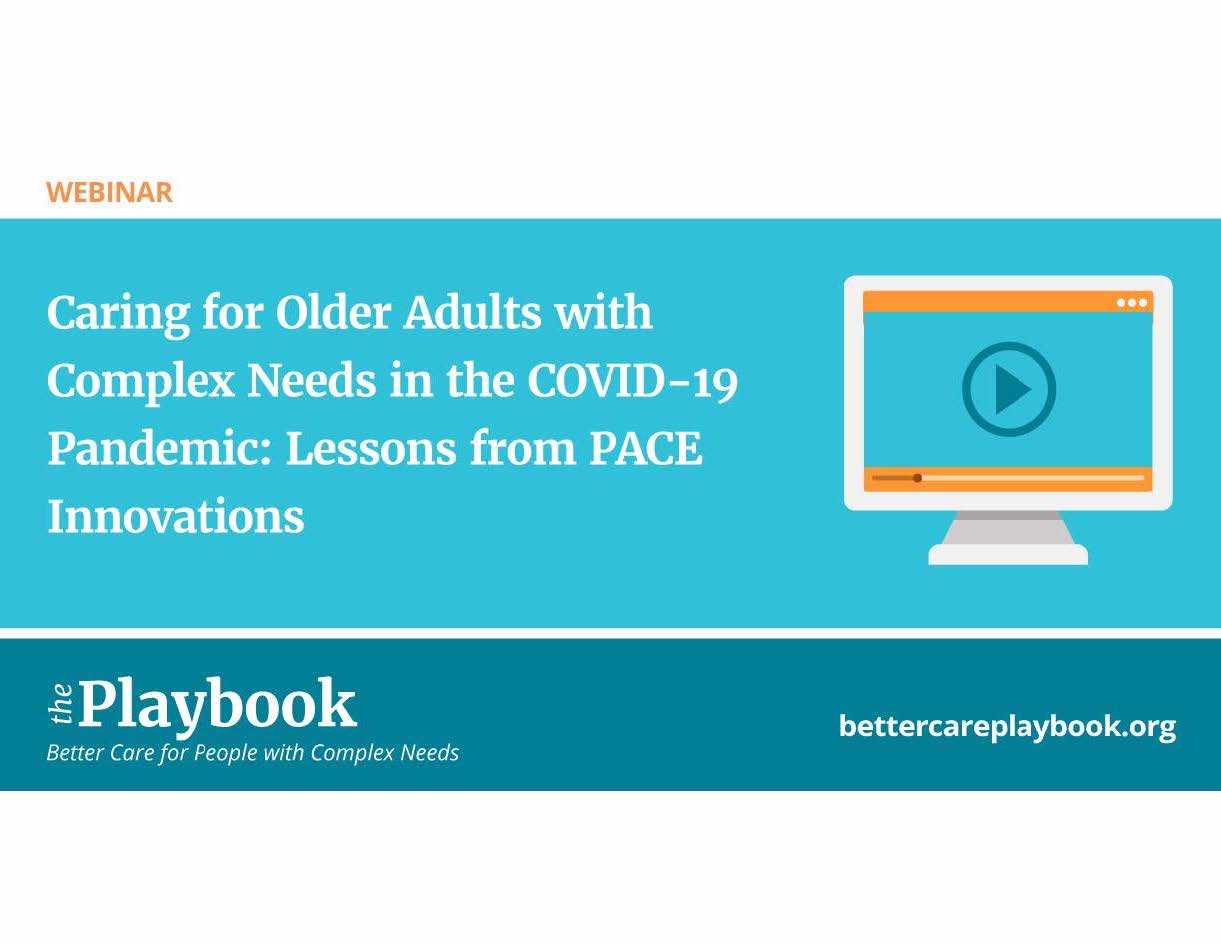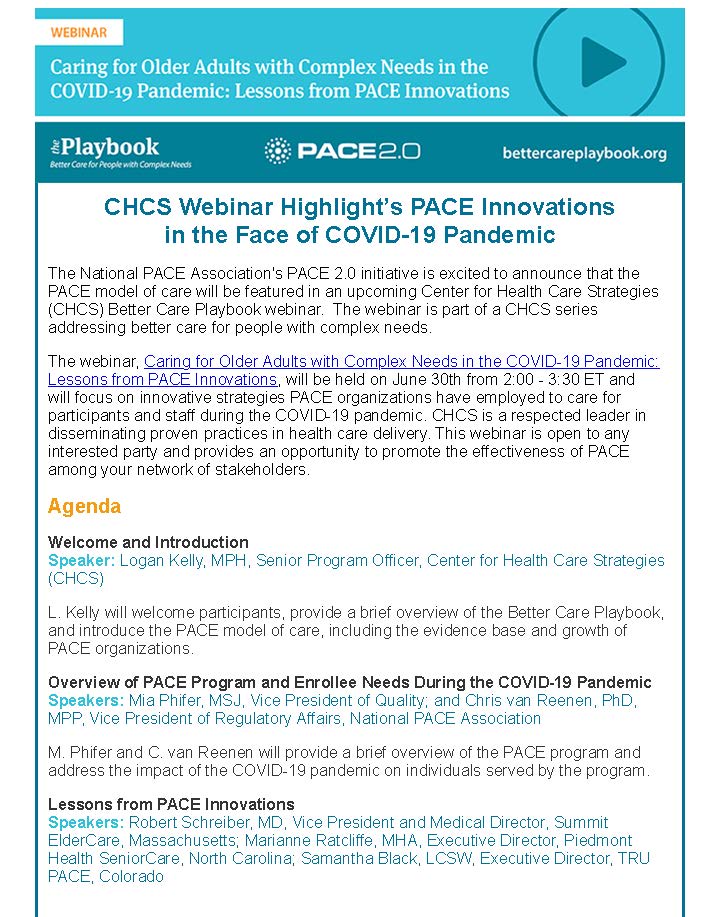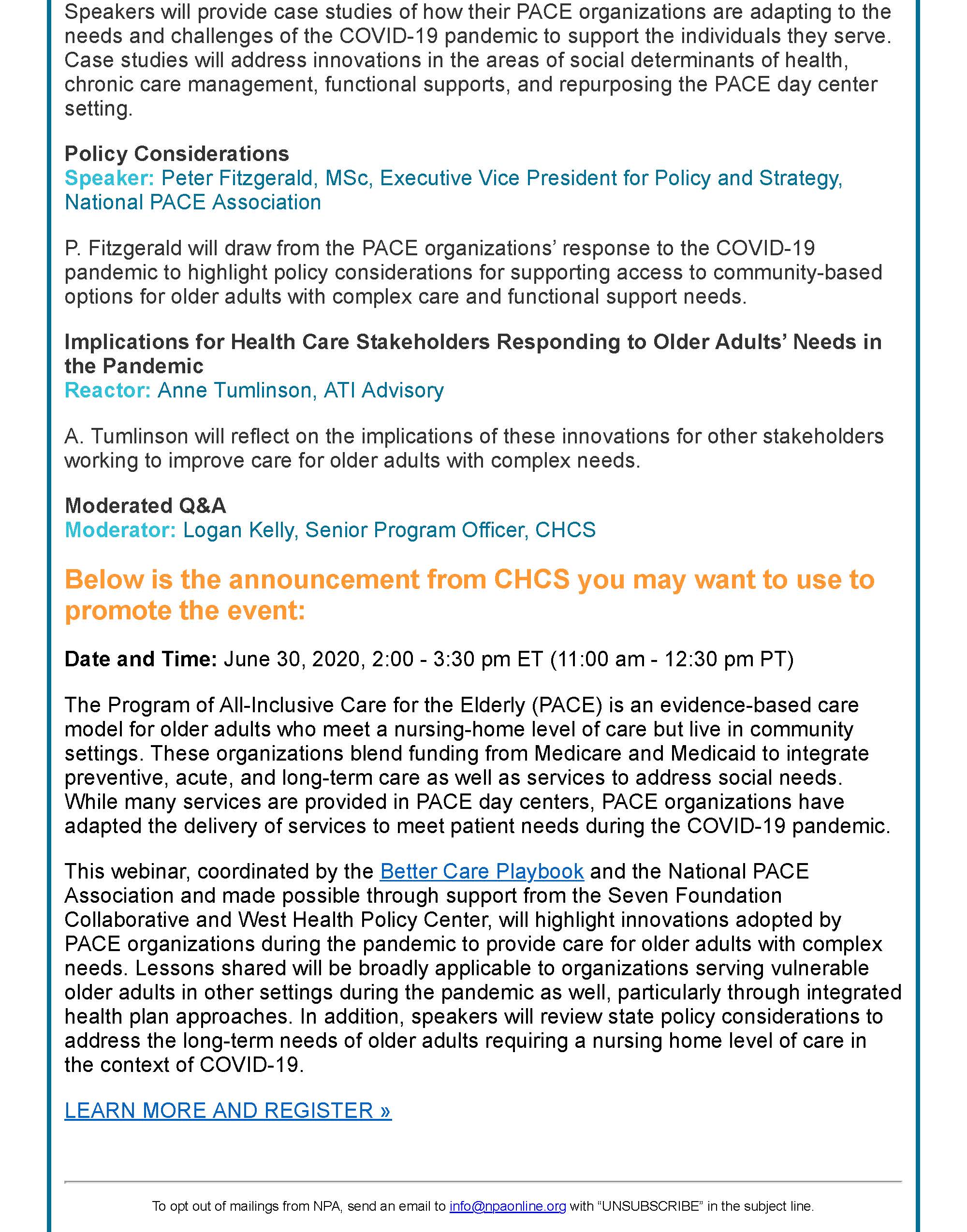Virtual Conference: MassPACE Conference Housing and PACE Part Two
This video was originally posted on Vimeo. Watch the video here.
This video was originally posted on Vimeo. Watch the video here.
Massachusetts Secretary of Health and Human Services, Marylou Sudders, to join PACE Leaders and Frontline Workers in Speaking at Event
MassPACE, the Massachusetts Association of the Programs of All-inclusive Care for the Elderly (PACE), today announced it will host the second annual MassPACE Conference virtually from October 28-29, 2020. The event will bring together key elder care leaders and state and national partners to collaborate on improving care
for the vulnerable elderly population in the state of Massachusetts.
The 2020 event will feature presentations on how PACE has pivoted to an at-home care model to protect elderly participants during COVID-19; strategies to drive long- lasting change to elder care; and how to partner with health and community organizations to improve the lives of older adults. Attendees will hear from PACE leaders, frontline workers, and state representatives as they discuss the biggest issues facing elder care, such as evaluating nursing home placement, addressing health disparities, and preventing avoidable emergency department visits and hospitalizations for those most at risk.
Marylou Sudders, MSW, ACSW, the Secretary of Health and Human Services for the Commonwealth of Massachusetts, will deliver the welcome and keynote address. Since joining Governor Baker’s cabinet in January 2015, Sudders has led the Executive Office of Health and Human Services, which represents 52% of the state’s
budget, and is comprised of 12 agencies, 2 state-operated Soldiers’ Homes and MassHealth, the state’s office of Medicaid. Sudders has advanced strategic policy priorities, including restructuring MassHealth into a population-based health coverage system, addressing the opioid epidemic, integrating physical and behavioral health care, and strengthening community-based services. Governor Baker appointed Sudders to lead the Massachusetts COVID-19 Command Center, a role she continues to hold, in addition to serving as Health and Human Services Secretary.
Adam Burrows, M.D., Medical Director for Upham’s PACE, the PACE organization of Upham’s Corner Health Center, will speak to the session “Thinking About Nursing Home Placement,” elaborating on critical factors to consider while evaluating nursing home placement versus at-home care and highlighting the use of his organization’s hybrid consumer-directed personal care worker program as a strategy for caring for participants at home. Dr. Burrows has been the Medical Director of Upham’s PACE since its inception in 1996 and has helped guide the program’s expansion to three PACE Centers throughout the city of Boston. He is a member of the Boston University Medical Center’s Geriatric Medicine faculty and just completed a two-year term as Chair of the National PACE Association’s Board of Directors.
Robert Schreiber, M.D., Vice President and Medical Director of Fallon Health’s Summit ElderCare program, will present the session “A Proactive Approach to Early Identification of Risk During the Pandemic and Beyond,” focused on how to leverage data to identify and intervene with at-risk patients to prevent unnecessary hospitalizations. Dr. Schreiber oversees medical care for Fallon’s PACE program, which is the sixth largest in the country and largest in New England. With more than 1,200 participants, Fallon has 5 PACE sites in Massachusetts and one in Western New York. Previously, Schreiber served as Medical Director of Evidence-based Programs at Hebrew SeniorLife and Medical Director of the Healthy Living Center of Excellence.
Wednesday, October 28 – Thursday, October 29, 2020
The event will be held virtually. For more information, visit https://whova.com/portal/massp_202010
To register for the event, visit https://whova.com/portal/registration/massp_202010
If you are a member of the media interested in complimentary access, please contact Kahler Buckley at kbuckley@ariamarketing.com
To learn more about MassPACE please visit masspace.net. Attendees looking to connect ahead of the conference can join the conversation on Twitter by using the hashtag #MassPACEConference2020.
BOSTON – September 9, 2020 – MassPACE, the Massachusetts association of the Programs of All-inclusive Care for the Elderly (PACE), is celebrating National PACE Month in September. The National PACE Association (NPA) has designated September as National PACE Month to raise awareness and celebrate the difference PACE makes in the lives of enrolled seniors, their families and their communities. PACE is a federally and state funded program that offers an alternative to nursing home care by providing eligible individuals with robust healthcare and social services to keep them living safely at home.
All of the PACE providers in Massachusetts are participating in National PACE Month by developing socially distanced programming to support older adults with long-term health needs and keep them engaged in their health. Element Care, a MassPACE program serving communities north of Boston and the Lowell and Lawrence regions, is conducting a Healthy Aging educational campaign to help members maintain their health while living at home. MassPACE is also using National PACE Month to highlight its ability to curb COVID-19 infections and, in many cases, fatalities. While 22 percent of infected nursing home residents in Massachusetts have died due to COVID-19 infection according to Dignity Alliance Massachusetts, less than 2 percent of MassPACE participants residing at home have succumbed to the virus.
“Every September, National PACE Month affords us a wonderful opportunity to highlight the significant impact our program has on elders as well as their families and communities,” said Candace Kuebel, executive director of MassPACE. “Though this year is different because of COVID-19, we are celebrating the resilience of our program and our ability to pivot and continue helping seniors living at home while navigating social distancing protocols. It has been a challenging several months, but we are happy that our unique structure has allowed us to continue upholding our mission of giving our participants freedom to live their lives in the community.”
To adapt to the pandemic, MassPACE member agencies swiftly transformed their care model, previously based in physical PACE centers, to at-home care delivery. The programs deployed tablets and similar technology for audio and video telehealth, social programming, nutritional counseling, and more to prevent gaps in care and sustain member engagement throughout the pandemic. The programs have also provided additional support and training for family caregivers when they are available to care for loved ones. Clinics at MassPACE centers have remained open by appointment, even while many appointments took place in participant homes.
“Caring for older individuals with multiple healthcare needs has been particularly challenging during this pandemic,” said Shawn Bloom, NPA president and CEO. “To keep participants and staff as safe as possible, the PACE model of care has been adapted from bringing individuals into a PACE center several times a week to providing services in the home. The flexibility of the model in the face of this pandemic has been inspiring.”
Massachusetts was one of the first states to pilot PACE. Since the launch of its first program in 1990, the Massachusetts PACE programs have grown to be one of the largest in the nation, serving more than 5,000 elderly individuals through eight regional programs across 28 PACE centers. Nationally, a total of 134 organizations operate 264 PACE centers in 31 states. Currently, more than 51,000 individuals are enrolled in the program. Though all enrollees are eligible for nursing home care, PACE has been successful in keeping more than 95 percent of its enrollees in the community and out of nursing homes.
In order to enroll in PACE, a person must be 55 or over, live in the service area of the PACE organization, meet clinical eligibility requirements for nursing home placement, and be able to live safely in the community with the support of the PACE organization. To learn more about MassPACE and enrollment, please visit masspace.net.
The MassPACE Association’s Mission is, through advocacy, education and policy research, to provide leadership and support for growth, access, quality, and success of PACE in the Commonwealth of Massachusetts. The VISION of MassPACE is that PACE will be accessible to every eligible consumer in the Commonwealth of MA and recognized as an extraordinarily innovative, accessible, valuable and effective model of care for individuals with significant healthcare needs.
The National PACE Association (NPA) works to advance the efforts of PACE programs, which coordinate and provide preventive, primary, acute and long-term care services so older individuals can continue living in the community. The PACE model of care is centered on the belief that it is better for the well-being of seniors with chronic care needs and their families to be served in the community whenever possible. For more information, visit www.NPAonline.org and follow @TweetNPA.
Ashley Owen for MassPACE
(978) 257-9000
aowen@ariamarketing.com
Robert Greenwood for National PACE Association
(703) 535-1522
robertg@npaonline.org
Date and Time: June 30, 2020, 2:00 – 3:30 pm ET (11:00 am – 12:30 pm PT)
Register Here
The Program of All-Inclusive Care for the Elderly (PACE) is an evidence-based care model for older adults who meet a nursing-home level of care but live in community settings. These organizations blend funding from Medicare and Medicaid to integrate preventive, acute, and long-term care as well as services to address social needs. While many services are provided in PACE day centers, PACE organizations have adapted the delivery of services to meet patient needs during the COVID-19 pandemic.
This webinar, coordinated by the Better Care Playbook and the National PACE Association and made possible through support from the Seven Foundation Collaborative and West Health Policy Center, will highlight innovations adopted by PACE organizations during the pandemic to provide care for older adults with complex needs. Lessons shared will be broadly applicable to organizations serving vulnerable older adults in other settings during the pandemic as well, particularly through integrated health plan approaches. In addition, speakers will review state policy considerations to address the long-term needs of older adults requiring a nursing home level of care in the context of COVID-19.


